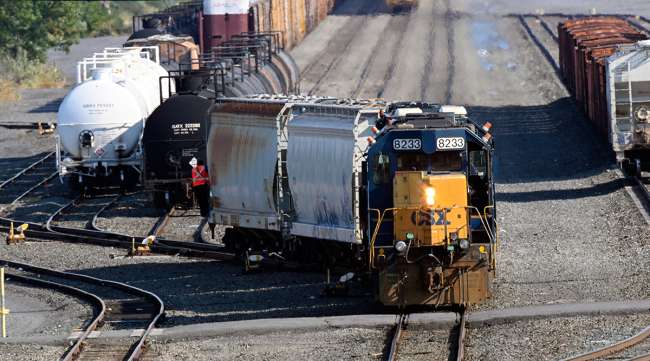Senior Reporter
Rail Strike Averted as Unions Agree to Deal

[Stay on top of transportation news: Get TTNews in your inbox.]
A deal has been reached between union workers and six Class I railroads, averting a threatened strike that could have snarled the nation’s freight and passenger rail service.
The U.S. Department of Labor — which had stepped in to help avoid a potential Sept. 16 strike — early Sept. 15 announced that a tentative agreement had been negotiated between the 13 railroad workers’ unions and the management council for the rail carriers. The announcement prevents what could have been a nationwide walkout by 150,000 locomotive engineers, conductors and other employees.
President Joe Biden in a statement said the agreement would guarantee “better pay, improved working conditions and peace of mind around their health care costs” for the workers, but specific details of the pact are not yet known.
What's Next
The tentative agreement will go to union members for a vote after a post-ratification cooling off period of several weeks.
However, a Presidential Emergency Board he earlier convened had recommended a settlement that proposed immediate 24% pay raises for workers retroactive to 2020 and immediate $5,000 bonuses. The management council, representing the six railroads, earlier had said parts of the wage increases and lump sum payments are retroactive and will be paid promptly upon ratification of the agreements by the unions’ membership.
Workers also have sought significant rule changes that would give them more flexibility in their schedules, in particular for sick days and personal time off.
The unions sought a change to the railroads' policies to ensure that workers can take time off to tend to medical needs when necessary, without fear of discipline, including suspension without pay or termination.
Without releasing details of the tentative deal, a spokesperson for the Labor Department said it “balances the needs of workers, businesses and our nation’s economy.”
The Labor Department statement noted that the tentative agreement came after 20 hours of face-to-face negotiating in Washington. Labor Secretary Marty Walsh took part in the talks.
Amtrak is working to quickly restore canceled trains and reaching out directly to impacted customers to accommodate on first available departures. Visit https://t.co/Bdp20oXtFZ for the latest updates.
— Amtrak Alerts (@AmtrakAlerts) September 15, 2022
Amtrak and other regional passenger railroads that share tracks with the freight railroads were planning to suspend long-distance service, and some freight operations also were being halted. It was unclear how quickly those operations might resume.
A strike would have idled about 7,000 freight trains a day run by CSX, Union Pacific, BNSF, Norfolk Southern, Kansas City Southern and other railroads, and disrupted passenger operations because Amtrak and half of all commuter rail systems rely at least partly on tracks owned by the freight railroads.
The trucking industry and other organizations had pressed for a settlement. American Trucking Associations President Chris Spear warned of the damaging economic impact a strike would have levied, and stressed that the industry did not have the excess capacity to move the additional freight that would have shifted off rails.

Spear
“Our supply chain is entirely interdependent, making the potential for a nationwide rail stoppage a serious threat to our nation’s economic and national security,” Spear said. “We applaud both sides for reaching a tentative agreement that averts this outcome and permits our supply chain to continue climbing out of this COVID-induced rut.”
As talks progressed, Spear sent a letter to Capitol Hill warning of the risks of a rail walkout.
The Association of American Railroads estimated a strike could have caused $2 billion a day in economic impact, disrupting agriculture, energy, retail, automotive and several other types of freight. The railroads move an estimated 30% of the nation’s freight each day, with the trucking industry transporting 70%.
“Thanks to the dedication of all members involved in the collective bargaining process, these new contracts provide rail employees a 24% wage increase during the five-year period from 2020 through 2024, including an immediate payout on average of $11,000 upon ratification, following the recommendations of Presidential Emergency Board No. 250. All tentative agreements are subject to ratification by the unions’ membership,” AAR said in a statement.

Steenhoek
The settlement comes at an important time for farmers, who are beginning harvest season. There were fears grain and other products would not be able to get to ports and markets had a strike occurred.
“We are extremely pleased both sides were able to arrive at an agreement. Our nation’s railroads are integral to the success of the American farmer. Without cost-effective, reliable rail service, so much of what farmers produce will never connect with our domestic and international customers,” Soy Transportation Coalition Executive Director Mike Steenhoek said. “American farmers are responding to the challenges of global food insecurity. We need our nation’s railroads to be a reliable partner in this effort.
“A strike, lockout or significant slowdown would have imposed significant harm on agriculture — particularly on the eve of harvest. The tentative agreement allows farmers and U.S. agriculture to proceed with doing what they do best — being the highest-quality, most reliable provider of food to the world.”
Want more news? Listen to today's daily briefing below or go here for more info:




